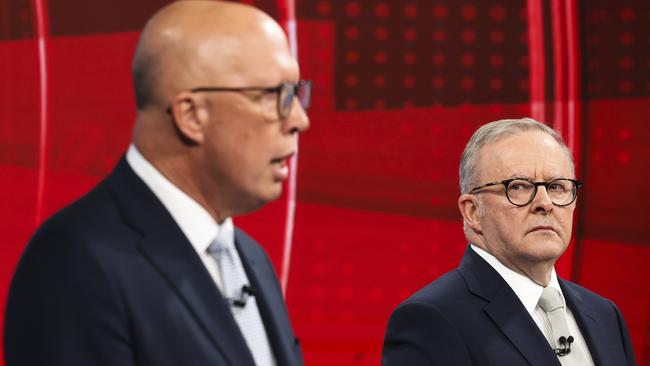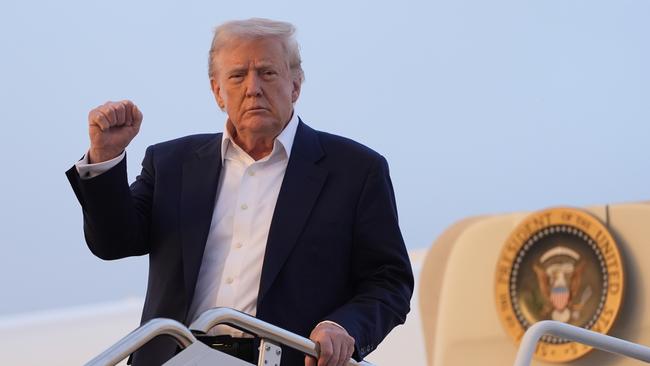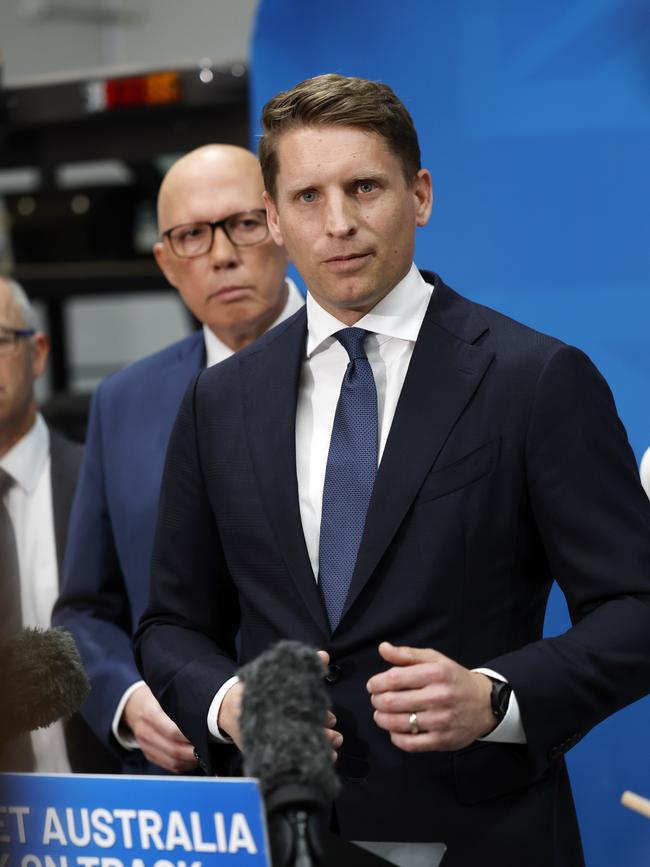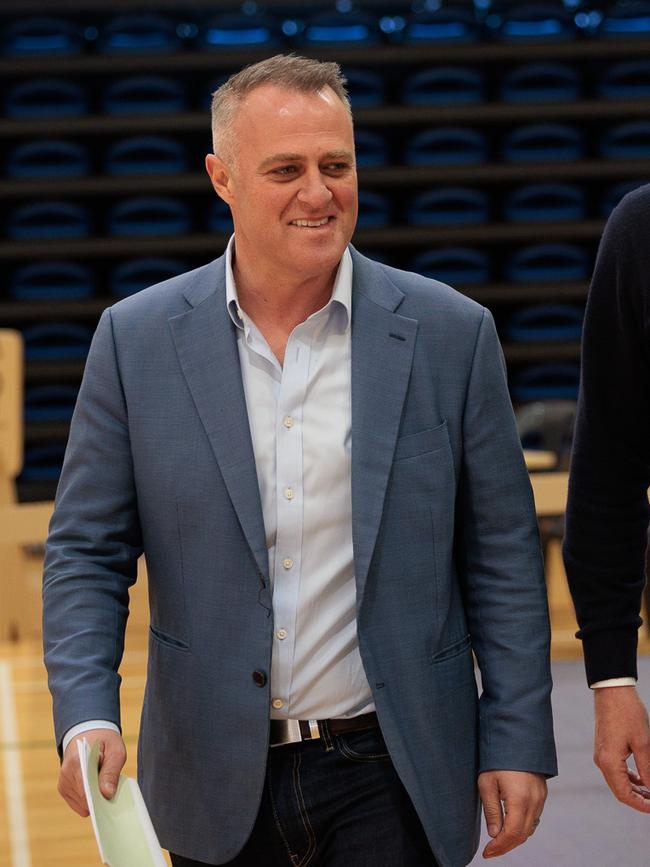The biggest single message out of our election is the monumental failure of the Australian establishment, in common with the establishment in most Western nations.
The world we have known for 80 years is effectively coming to an end, but our biggest issue was work from home.
Two huge factors, unpredicted six months ago, were Donald Trump and the staggering incompetence of the Liberal campaign.
Underlying this, the failure of the Australian establishment, as broadly defined, mirrors a similar failure in the US, Britain and other Western nations.
Politics is not responding anywhere to the deepest policy problems. Politics is becoming petty, ridiculous and fractured. The continued decline in the primary vote for the two major parties in Australia is part of this.
At this election, just over 66 per cent of voters supported either Labor or the Coalition, nearly 2 per cent below the 2022 figure. Labor gained a couple of points, the Coalition declined. It’s hard to see the long established trend of declining support for the major parties reversing, short of a national crisis.
Our electoral system has its perversities. Labor won several seats on Liberal preferences. In all the teal seats the Liberals failed to win back, and in any seat such as Bradfield they might yet lose to a teal, Liberals lost because Labor put them last on its how to vote card.

The mechanics of the system thus massively favour Labor. I think it’s right the Liberals preference the Greens last. But the political argument for the Liberals runs two ways. If Liberals put the Greens last they make Labor look brilliant. If they put the Greens ahead of Labor, they put Greens in parliament. That drags the whole political culture to the left. But it also drags Labor to the left and makes the choice between Labor and the Coalition more stark.
If the Greens were smart enough to remain an environment party, like, say, the German Greens, rather than a party of Marxist abuse and nihilist policies, obsessed with Gaza, they might even have a case for attracting Liberal preferences.
The teals are effectively Greens stripped of their worst excesses. More moderate Greens could do to Labor what the teals do to the Coalition. Or the teals could do it to Labor.
Albanese’s big victory came with a lower primary vote than Julia Gillard got in 2010. Albanese has a landslide lead against the Coalition, but not a landslide parliamentary majority. Tony Abbott won 90 seats in 2013. Labor is winning 88 at the moment.
This could be important in the long run. Britain’s first-past-the-post electoral system is even more comprehensively designed to preserve two-party dominance than our preferential system. Yet after the stunning success of Nigel Farage’s Reform Party last week in local elections and a by-election, and its strength in opinion polls, Britain is now effectively a five-party system: Labour, Conservative, Liberal Democrats, Scottish Nationalists and Reform. That’s not even counting parties that get seats in Westminster from Northern Ireland. Governments are elected on ever smaller shares of the vote. Keir Starmer won a parliamentary landslide for Labour last year with a lower vote than Jeremy Corbyn when he led the party to defeat in the 2017 general election. That brings problems of democratic legitimacy.
Trump was a big factor in Australia. In Canada, the Trump factor took the Conservatives from a 25-point lead to just losing a narrow election.

In Australia, the Trump factor took an even contest and made it a big win for Labor. The electorate moved left. Labor, Greens and teals won more than 50 per cent of the primary vote.
Trump is hurting centre-right parties everywhere. Trump now looks, even to American voters, nasty, turbulent and the cause of instability. Voters hate those qualities, especially in a compulsory voting system like Australia’s. Centre-left parties everywhere paint their conservative opponents, however unfairly, as mini-Trumps. Trump has managed a monumental inversion of the long, normal pattern of democratic politics. He has, incredibly, associated conservative parties with instability.
Initially, Dutton campaigned in part on being better able to get on with Trump than Albanese. Some of Dutton’s early moves, such as proposing an office of government efficiency, in clear imitation of Trump’s Elon Musk-led Department of Government Efficiency, underlined the psychological connection with Trumpism. It was dangerous even when Trump had his initial moment of popularity. It developed as spectacularly ill-advised.
Overall, the Coalition campaign was the worst I’ve seen. It must discredit Angus Taylor almost as much as it discredits Dutton. It was tactically a nightmare: policy reversals, repeated gaffes and misstatements, a wacky emphasis on message discipline so extreme that all the Coalition’s best frontbenchers – Dan Tehan, Andrew Hastie, Sarah Henderson – were virtually kept in hiding.
Liberal frontbenchers had prepared detailed policies months in advance they were never allowed to release. The Coalition had almost nothing to say about anything. It represented a void, a nothingness. It thought Labor would lose the election and it need do nothing but be still and quiet.
Some of the tactical missteps were almost unbelievable. The defence policy was not released until days before the vote. Labor’s appalling policy to tax unrealised capital gains in superannuation funds was a ready-made Coalition scare campaign which could have terrorised every Australian with a superannuation balance. The Coalition barely mentioned it.


The Coalition offered its troops nothing to fight for and almost nothing to fight against. Its one big contrast with Labor was, bizarrely, to offer higher income taxes, rejecting Labor’s albeit tiny income tax cut.
All this speaks to spectacular incompetence. But it also speaks to character and cowardice. Consider this example. The Coalition needs to do much better with women and young people. A key problem for young people is home ownership.
At the previous election, the Liberals had one policy to address this, allowing people to use part of their superannuation balance for a first-home deposit. Because they were scared of the superannuation funds, they didn’t release the policy until just a few days from the election.
That was pure cowardice. In politics you must be willing to crusade passionately for things you believe in. Politics requires core beliefs which you have to fight for and which define your political identity. A successful political movement polarises the electorate and wins the argument. The modern Liberals have become such cowards they’re always trying to win without fighting the policy fights. By fighting I don’t mean being bad-tempered, but just actually engaging in a serious policy battle, which can’t be done only in the leader’s office.
The Liberals today are incompetent at politics. In 10 years in office they built no institutions which broadly share their world view. A decade of Labor will give us countless climate bodies, trade union training authorities, university think tanks, which generally won’t be overtly partisan but will share a basic Labor world view.
Here is a small secret of politics. You need to believe something. You need to fight for it. And you need to be smart. Tim Wilson, who looks as though he’ll win Goldstein back, is a good example. The Coalition this time demonstrated little conviction and no smarts. It’s a long road back. Better start soon.



